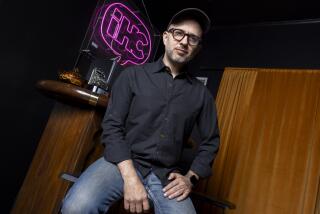‘The Vow’ a hit after marketers say ‘I do’ to Twitter, Facebook
Channing Tatum lowers his green eyes and stares at the camera.
“Your friend wanted me to tell you that they think you’re pretty awesome,” the 31-year-old actor says. “And they love hanging with you.”
Tatum’s performance wasn’t from a movie, but a “Sweet Nothings” video that marketers for his new film, “The Vow,” posted on Facebook in advance of its opening last weekend. It worked: The romantic tear-jerker blew past expectations to open at No. 1 with $41.2 million in North American ticket sales.
Two years ago the film industry was largely perplexed by social media and how they would affect its business. Today, studios are embracing not just Twitter and Facebook but also more obscure sites like Instagram and We Heart It, adding them to traditional research and marketing tools such as comment cards at test screenings.
Just this year, they’ve been credited with lifting the box-office performance of “The Vow,” early February’s teen adventure “Chronicle” and January’s low-budget horror sensation “The Devil Inside.” All of them were red hot on social networks and performed better on their opening weekends than predicted by traditional research based on telephone surveys.
Movies like “Midnight in Paris” and “The Artist” will never be Twitter phenomena. But younger people, particularly women, now live much of their social lives online. As a result, studios are spending millions to chat directly with fans younger than 30 about coming movies and are paying a growing number of research firms to mine digital conversations for insights into what movie audiences are excited to see, which actors they like and whether new trailers are landing with a splash or a thud. Some executives now receive weekly or even daily reports on the social media activity related to their films, alongside box-office reports.
“If you have thousands of people talking about your movie, don’t you want to know what they’re saying?” said Ben Carlson, president of research firm Fizziolo.gy. “The leap people are starting to make is that social media is actually reflective of what audiences think about your movie.”
When a trailer for “The Vow” premiered in November, Sony’s digital marketing president, Dwight Caines, noticed that young women couldn’t contain their enthusiasm online.
“Channing Tatum + Rachel McAdams = Amazing,” tweeted one Twitter user. “I get goose bumps every time I see it,” gushed another. “This is going to be an EPIC LOVE STORY!!!!” raved a third.
Caines wanted to capitalize on the online frenzy and accelerated a campaign to keep the fans talking. In addition to bringing Tatum to Sony’s Culver City lot to shoot more video greetings, he had staffers pose questions and respond to comments on Twitter, post digital greeting cards called “VOWchers” on the movie’s Facebook page, and upload photos to the picture-sharing site Instagram.
The studio even posted regular messages about “The Vow” on a page devoted to one of Tatum’s old movies, “Dear John,” another romantic drama, with more than 5 million Facebook fans.
“We didn’t put our resources into building a big immersive website, but are instead inspiring people to share content at the places they live online,” Caines said.
The effort helped spur the online chatter to a roar. In the week before it opened, “The Vow” generated more digital media buzz than any film since November’s “The Twilight Saga: Breaking Dawn — Part 1,” according to Fizziolo.gy. A record-setting 92% of the comments were deemed positive.
The online roar continued on opening weekend, with “The Vow” posting the most social media traffic for any film this year. “I’m not doing my makeup for tonight when I go see the vow because I know for a fact ill cry,” tweeted one fan. “The Vow was the best movie ever #seriously #newfavmovie #criedlikeababy,” said another.
Sony still spent tens of millions of dollars — most of its advertising budget — on traditional platforms like TV ads. Skeptics of social media say there’s not yet any evidence that digital marketing can get the millions of fans needed for a big opening weekend excited in the same way as a 30-second TV spot during “The Voice” or “CSI.” Studios still rely on television commercials to reach mass audiences even as viewers are increasingly using their DVRs to skip the promos.
Not everyone in Hollywood is sold on the reliability of online media. Skeptics say online hype often fails to represent the entire spectrum of moviegoers’ feelings. In 2010, “Scott Pilgrim vs. the World” was a hot topic online but a flop at the multiplex.
“I don’t think it’s reliable,” said Chris Aronson, executive vice president of distribution at 20th Century Fox. “If it was so easy to gauge social media and convert it to predicting performance, everybody would be doing it. But it’s an impossible thing to do at this time.”
Several movies coming out this year are looking to stoke excitement on social networks. For its adaptation of the bestselling young adult trilogy “The Hunger Games,” Lionsgate used Facebook to announce casting for 24 key characters in the movie. For July’s “The Amazing Spider-Man,” Sony Pictures organized a Web and Twitter campaign around special screenings of scenes from the movie, held in 13 cities around the world Feb. 6.
Tatum, who has more than 800,000 Twitter followers and 500,000 Facebook fans, pays a digital guru to manage his accounts and speak for him online, and says he was doubtful when Sony first asked him to shoot the “Sweet Nothings” greetings.
“I was like, ‘Are people really going to want to watch this?’ It’s sort of weird to me,” the actor said. “But I’m slowly beginning to change.... I’m seeing that the more you can connect, the better it is.”
More to Read
The biggest entertainment stories
Get our big stories about Hollywood, film, television, music, arts, culture and more right in your inbox as soon as they publish.
You may occasionally receive promotional content from the Los Angeles Times.







